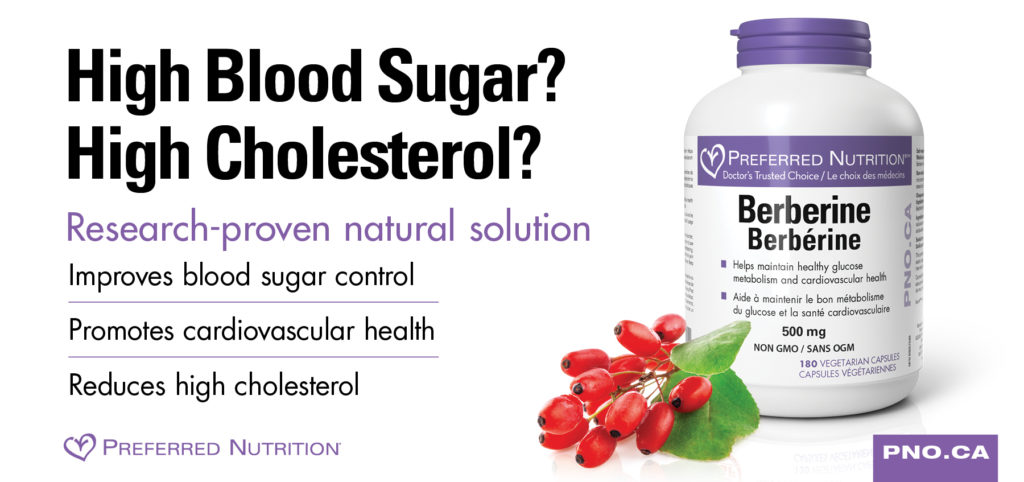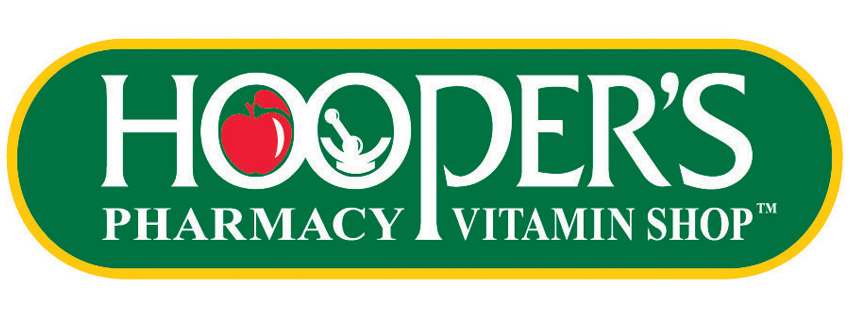
The Preferred Nutrition line of supplements has been developed with effective formulas
using superior ingredients to create a premium quality brand, exclusive to health food
retailers and select natural pharmacies. Our supplements promote the health
and well-being of consumers of all ages.
PRODUCT SUMMARY
Preferred Nutrition Berberine is a concentrated barberry root extract used to support healthy glucose metabolism and cardiovascular health in adults. Berberine is an alkaloid that occurs naturally in certain
medicinal plants. It is a fantastic option for people who want to support blood sugar balance and healthy cholesterol levels with the convenience of just two vegetarian capsules per day.
BENEFITS
- Supports healthy glucose metabolism
- Helps maintain cardiovascular health in adults
- Helps support healthy cholesterol levels
- Helps support healthy blood lipid levels
- Supports insulin sensitivity
RESEARCH
Berberine is an alkaloid that occurs naturally in a variety of medicinal plants, including the roots of Berberis vulgaris (barberry). It has a long history of therapeutic use, with a large body of research focusing on its success in managing blood glucose, blood lipids, and insulin sensitivity (Tabeshpour et al., 2017). Multiple clinical studies support the benefits of berberine when taken at a dose of 500 mg twice per day
(Firouzi et al., 2018).
Berberine’s activity begins during digestion when it inhibits some of the enzymes responsible for breaking down carbohydrates and starchy foods in the digestive tract. This helps lower the amount of glucose
that is absorbed into the bloodstream (Firouzi et al., 2018). When glucose is absorbed, berberine helps the body use it more efficiently by activating an enzyme called AMP-activated protein kinase (AMPK).
This encourages glucose uptake into cells and stimulates its conversion into energy (Firouzi et al., 2018).
A review of 28 studies of diabetic patients confirmed that berberine significantly reduces fasting and postprandial blood glucose, especially within its first three months of use (Liang et al., 2019). A 16-week
randomized clinical trial compared the effects of berberine, lifestyle modifications, and a commercial diabetic therapy on metabolic parameters of patients with non-alcoholic fatty liver disease (NAFLD).
Compared to lifestyle modifications alone, supplementation with two 500 mg doses of berberine per day and lifestyle modifications provided superior metabolic benefits, including a reduction in postprandial
glucose within the first four weeks of supplementation, plus improved insulin sensitivity, body weight, waist circumference, blood cholesterol, and triglyceride levels (Yan et al., 2015).
Berberine supports insulin sensitivity and enhances the activity and number of insulin receptors available to move glucose out of the blood stream (Firouzi et al., 2018). As part of a three-month clinical study,
patients with metabolic syndrome were supplemented with three 300 mg doses of berberine per day. Compared to patient baseline levels, fasting insulin was found to decrease by 26% and blood glucose
decreased by 17%. Improved insulin sensitivity may have encouraged a reduction in lipid stores, as berberine was also found to reduce patient body mass index and waist circumference (Yang et al., 2012).
Dyslipidemia, defined as low HDL (high-density lipoprotein) combined with elevated LDL (low-density lipoprotein) and triglyceride levels, is a cardiovascular risk factor. Berberine helps the body manage blood
lipid levels by stimulating AMPK activity and supporting effective lipid metabolism by the liver Tabeshpour et al., 2017). Randomized clinical trials support this activity and have consistently shown that berberine can significantly reduce LDL levels by 0.5–1.3 mmol/L and triglyceride levels by 0.6–1.4 mmol/L (Koppen et al., 2017)
In a randomized, placebo-controlled study, 116 diabetic patients with elevated blood lipid levels were supplemented with two 500 mg doses of berberine per day for three months. Compared to baseline lipid
levels, berberine significantly reduced total cholesterol by 18%, LDL by 21%, and triglycerides by 36%. Berberine also reduced post prandial blood glucose by 28% (Zhang et al., 2008). The same dose regime was used in a randomized, placebo-controlled study of patients with hypercholesterolemia but who were otherwise healthy with low cardiovascular risk. After three months of supplementation, total cholesterol and LDL levels had decreased by 12% and 16% respectively (Koppen et al., 2017; Derosa et al., 2013).
This information is for education purposes only, and is not intended for self-diagnosis or self-treatment of conditions that should be assessed and treated by your health care practitioner. This product is not intended to diagnose, treat, cure, or prevent any disease.
© All rights reserved – Assured Natural Distribution Inc. • 9225793 • March 11, 2021 •
Click here to read full article and references.




